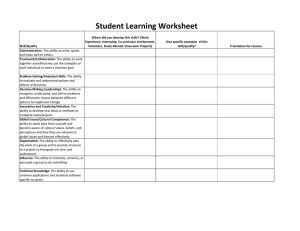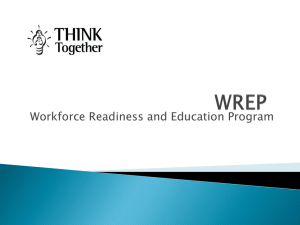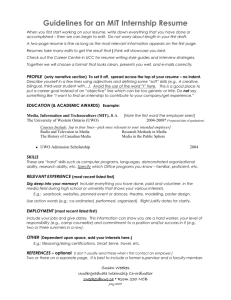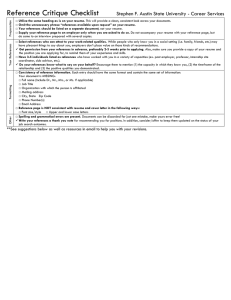Part I: Resume Writing Resumes
advertisement
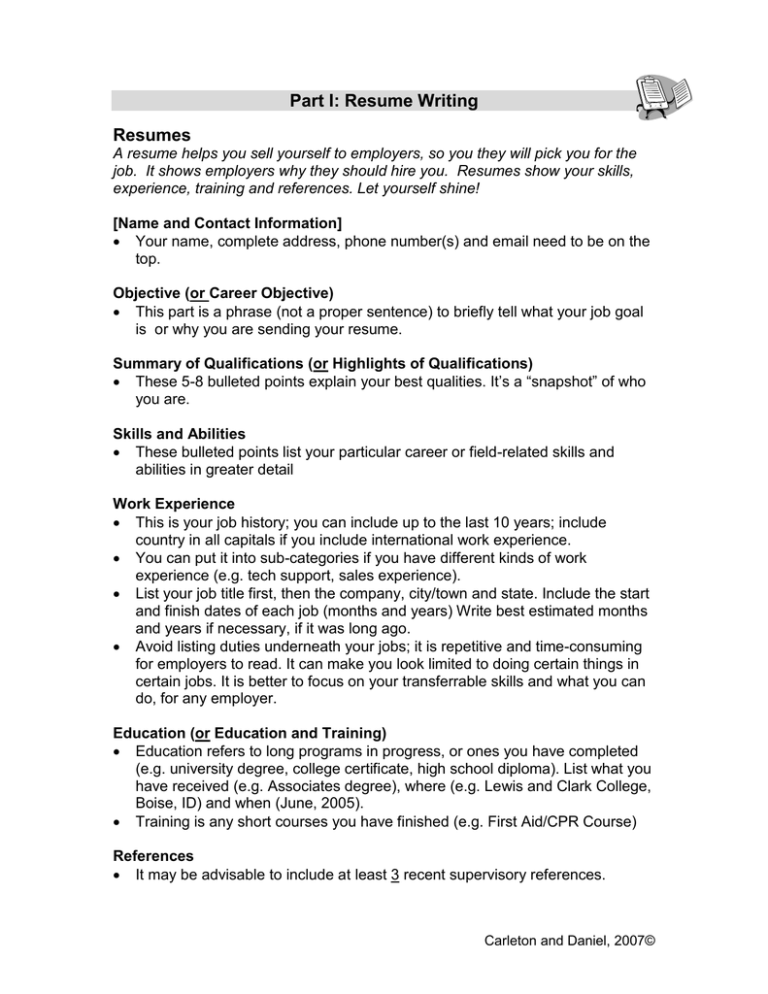
Part I: Resume Writing Resumes A resume helps you sell yourself to employers, so you they will pick you for the job. It shows employers why they should hire you. Resumes show your skills, experience, training and references. Let yourself shine! [Name and Contact Information] Your name, complete address, phone number(s) and email need to be on the top. Objective (or Career Objective) This part is a phrase (not a proper sentence) to briefly tell what your job goal is or why you are sending your resume. Summary of Qualifications (or Highlights of Qualifications) These 5-8 bulleted points explain your best qualities. It’s a “snapshot” of who you are. Skills and Abilities These bulleted points list your particular career or field-related skills and abilities in greater detail Work Experience This is your job history; you can include up to the last 10 years; include country in all capitals if you include international work experience. You can put it into sub-categories if you have different kinds of work experience (e.g. tech support, sales experience). List your job title first, then the company, city/town and state. Include the start and finish dates of each job (months and years) Write best estimated months and years if necessary, if it was long ago. Avoid listing duties underneath your jobs; it is repetitive and time-consuming for employers to read. It can make you look limited to doing certain things in certain jobs. It is better to focus on your transferrable skills and what you can do, for any employer. Education (or Education and Training) Education refers to long programs in progress, or ones you have completed (e.g. university degree, college certificate, high school diploma). List what you have received (e.g. Associates degree), where (e.g. Lewis and Clark College, Boise, ID) and when (June, 2005). Training is any short courses you have finished (e.g. First Aid/CPR Course) References It may be advisable to include at least 3 recent supervisory references. Carleton and Daniel, 2007© 2 Tip: phone and check in with them in case they have moved, and ask out of curiosity what they would say about you as an employee – mentally prepares them for a phone call). Putting “Available Upon Request” can sometimes result in a resume being filed or going in the garbage if it means more work for a busy employer to request references, and match them with resumes (from a pile). Also, check with state laws with regard to providing confidential information upfront. Your Guide to Resume Writing: Action Words Use action words to describe your experience and accomplishments. Here are some actions words to use: achieved acquired adapted addressed administered analyzed anticipated assembled assisted audited budgeted calculated centralized changed collaborated composed condensed conducted constructed contracted converted coordinated created cultivated demonstrated designed developed devised discovered doubled drafted edited eliminated enforced established evaluated expanded explained forecasted formed founded generated guided hired implemented improved informed insured interpreted interviewed launched maintained managed marketed minimized motivated negotiated obtained operated organized originated oversaw performed planned prevented produced programmed promoted provided publicized published recruited reorganized reported researched resolved reviewed selected separated set up simplified solved surveyed staffed supervise taught tested trained used 3 Internship Resumes Will you be looking for that perfect internship to expand your horizons and build your experience base? If your answer is "yes," you must have an up-to-date resume, ready to go at all times. A well-constructed resume, identifying your goals, academic background, skills, experience, and activities, is just as necessary for the internship search as it is will be for your job search later on. So, it's never too early to get to work on your resume. With a resume in hand, you'll be able to respond to opportunities that come your way on the Internet, through networking, or research. The resume you design to land an internship will have much in common with the employment resume. The standard chronological resume includes the following: Identifying information (name, address, telephone, e-mail address) Objective statement (one line that gives your immediate goal); Education (name, city, state, degree, institution, major, minor, and GPA) Relevant course work Experience (job title, company, city, state, dates of employment, tasks and achievements using verbs and key nouns. Activities; Skills Your internship resume will include: An objective statement with the word "internship" and your field. For example: "Internship in mechanical engineering.” Provide detail about your academic background, including relevant courses, GPA, honors, scholarships, etc. to indicate you are a quick learner. Include dates for education and experience, including your projected date of college graduation. Use academic units of time to pinpoint your dates: for example, Summer, 2004 rather than 6/03-8/03 or Fall, 2004 rather than 9/200412/2004. Include detailed information about activities: volunteer work, research, and leadership. List all jobs held, although they probably do not relate to your career goals. You will be communicating a strong work ethic, and you will be demonstrating some skills and accomplishments. You need your first internship to get you started with career related experience; you can't be expected to have it in the first place! Your employment resume will probably highlight relevant and “other” experience. Identify your skill set. Put yourself in the internship manager's place; what skills do you think she would like to see in an intern? Computer skills? Foreign language? Organizational? Ability to coordinate? Research? Try to match your skills with those needed. (Don't forget to ask an advisor from your career center to help you pinpoint these skills.) Limit your resume to one page. While it is sometimes permissible for the employment resume to run to two pages, the internship resume should be streamlined. Resume Checklist: Self-assessment Use this checklist once you have a final draft of your resume to review. Did you…. Use Microsoft Word? Use a plain font, size 12? Provide your name, complete address, phone number, and email at the top? Use a current address and phone number? Enter your objective, briefly stating your employment/internship goal? Provide a summary (or) highlights of your qualifications in 5-8 bulleted points? Include your skills and abilities with relevant detail? Use action verbs to present your skills and abilities? State your education and training with dates and details? (institution, where) Include your overall GPA and major Include courses or training outside your degree that are relevant to the position? Give your work history up to the last 10 years? (with a relevant focus) List your job title first, company, city/town and state/province/territory and country? Highlight job titles using Italics or cold font? Include start and finish dates of each job? (used estimates if necessary) Avoid listing duties under your jobs? (tedious to read) Have at least 3 supervisory references? (listed or prepared separately) Check with references in case they have moved, let them know you are referencing them, and gauge if they will provide a good reference? Add other sections relevant to the job for which you are applying? Avoid including age, gender, religion, political affiliation, marital status, social security number, or photographs? Use clear and concise language? Avoid first person pronouns (I, me, my)? Use proper punctuation and spelling? Only use relevant technical jargon? Ensure the length is no longer than 2 pages? (*preferably 1 page for internships) Include only experience and education pertinent to the position? Use consistent formatting? Avoid too small margins (no less that .75")? Print on high-quality paper? (if not submitting electronically) Use paper preferably in a neutral shade? (e.g. beige/grey, if submitting hard copy) If you left a box unchecked or have any questions, see the Career Center for assistance. What are 3 things you can do to get your resume ready for an employer? 1. ______________________________________________________________ 2. ______________________________________________________________ 3. ______________________________________________________________ Carleton and Daniel, 2007©

